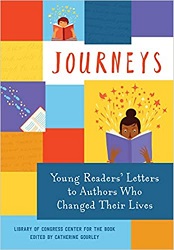
 Journeys
JourneysYoung Readers’ Letters to Authors Who Changed Their Lives
Review posted April 12, 2021. Candlewick Press, 2017. 226 pages.
Review written July 5, 2019, from a library book
Starred Review
This book is a collection of fifty-two letters written by young readers to authors about how their lives were touched by the authors’ books. Here’s an excerpt from the Foreword:
Over the years that Letters About Literature has invited young readers to share their personal responses to authors with us at Center for the Book, we have learned that children often approach reading with reluctance and that writing about what they read is often a challenge and, for some, a struggle.
This volume of letters is a showcase of young minds and hearts inspired and at times healed by the power of an author’s words. As the letters so poignantly illustrate, not all books are right for all readers. Likewise, two readers can interpret and respond to the same book quite differently. For some children, finding that right author, that right book, is in itself a bit of a journey. Once a reader finds that author and that book, something remarkable occurs. Readers discover themselves within the pages of the book. They begin to feel and to understand.
The letter-writers range in age from fourth grade to twelfth grade. Almost all of them are deeply personal. Since the editors chose from twenty-five years of letters, this isn’t a surprise. Each letter is showcased with a short description of the author and book they responded to.
I’m going to include a few random excerpts from letters. It’s not hard to find good quotations:
About Crispin: The Cross of Lead, by Avi:
I want to be a writer that opens up doors for people. I want to set scenes and describe occupations that not everyone can become. People may not have the physical or mental capabilities to be an astronaut, race-car driver, teacher, dancer, or baseball player, but for a time, I want them to experience what each of those professions would be like.
I am a ten-year-old boy. I have mild cerebral palsy, but for one cool fall afternoon, I became Crispin, living in the Middle Ages. Thank you for that gift.
About The Book Thief, by Marcus Zusak:
I used to be afraid. I used to wake up screaming and seeing a yellow star sewn onto my clothing. I have read many books about the Holocaust, but none of them struck me like The Book Thief. Instead of pain and fear, it is a book that focuses on courage, kindness, the power of words, and hope.
About the Harry Potter books, by J. K. Rowling, from a girl who’d been forbidden to read them:
You have given the world a gift, Ms. Rowling. You have given millions of people a friend, an adventure, and a happy ending that never ceases to amaze. So now, I thank you. Thank you for giving a little girl and her siblings someone to admire and dream about. Thank you for teaching the children of this world how magical love is, and most of all, Ms. Rowling, thank you for giving me Harry.
From a high school student about The Things They Carried, by Tim O’Brien:
When the soldier eventually kills himself, I was jolted awake. Why are death, war, and loss such taboo subjects? Why must we bury them down deep inside, cover our fears and uncertainties with a strained smile, and ignore a whole part of ourselves? No longer was I going to hide the past and the pain. I wouldn’t give up because people were unwilling to listen. I would spin words into poetry and attempt to define the indefinable. Circumstances had broken my heart, weighed down my shoulders, and given me a lifelong burden to carry. Yet I was unwilling to succumb to the same fate as the disillusioned soldier. I would not be shattered.
Your last story simultaneously opened fresh wounds and gave me the first real comfort since my mom’s death. I cried when Linda died. It was tragic. She was so young. I thought of my mom and it was almost unbearable. However, I realized from your book that stories could keep a person alive. Stories allow us to visit the past how it was: untainted in its beauty and unmarked by death or struggle.
And I love this one, about The House on Mango Street, by Sandra Cisneros:
“We are tired of being beautiful.” Thank you for writing those words. I was thinking them. I felt their unspoken pressure until they broke off your page and got stuck in my heart. That was your trick, I suppose. You wrote what everyone was thinking. You are so far away from me, so different, and still you spoke to me and I understood you. You knew me all along.
I am not fat anymore. I never was, I suppose, or maybe I still am. But I’ve stopped thinking about it and I am fine. “I am too strong for her to keep me here forever,” you wrote. I know that by “her,” you meant Mango Street, but I read it as “my body” and “my mind.” My heart came back together then, and I have you to thank for that. You didn’t tell me how to pull myself back together; you just showed me that I could. I was tired of trying to be somebody else’s definition of beautiful, and you told me that was okay. Beauty is not in the beholder, but in she who is beheld.
If you’ve ever wondered whether books can truly change lives, I highly recommend reading this book.
